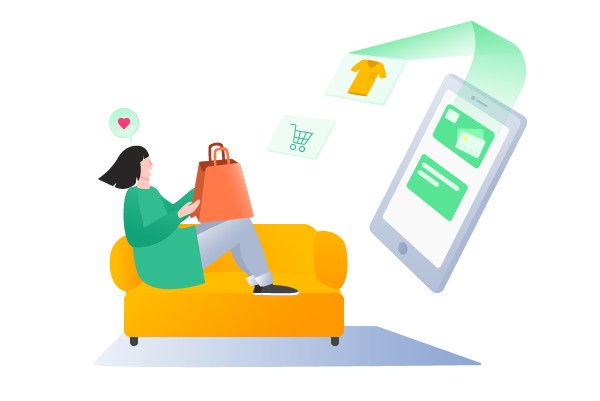Introduction
According to BrizFeel report, almost every second buyer today uses their smartphone to purchase goods. Is this not a reason to enhance your business by developing an e-commerce app? Below we will discuss in more detail the process of future mobile commerce app development, as well as consider a number of technologies that will be useful in implementing such software.
Mobile Technologies and E-commerce: Successful Tandem
In fact, mobile commerce has come a long way since deriving from internet commerce. It provides a fundamentally different level of user experience as compared to traditional shopping. Therefore, to begin with, let’s review one simple question: “Why mobile commerce and mobile apps?”.
- Widespread service availability. Mobile commerce has allowed developers and brands to change the way products are presented and delivered to customers. Firstly, with this format of purchases, the influence of human factor is eliminated maximally: now customers do not have to crowd in lines, encounter incompetent sellers, and go to some distant store to make a purchase they are interested in. Secondly, it became possible to make purchases on the go, simply by means of a smartphone connected to the Internet.
- Features unavailable to commercial websites. Many modern mobile applications are not just adapting ordinary online stores to mobile platforms; they provide something more for their users. For example, Caratlane’s Virtual Try On app allows potential customers to try the jewelry on using smart image overlay technology. Thanks to such functions, the personalization of user experience is ensured.
- An opportunity to spend less time shopping. This factor, in principle, distinguishes all e-commerce solutions. Instead of walking around the malls for hours, you get the opportunity to shop from a comfortable environment – home, office, cafe, etc. Moreover, you get access to those stores that may be too far from you geographically – in other cities or even countries.
- Innovative technologies. The usual offline store has little capabilities to introduce most of the modern technological advances. A completely different matter is a mobile application that has access to a camera, GPS, accelerometer, and other specific aspects of smartphones. Such features can significantly expand the usual functionality of online trading platforms. Particularly interesting here is the concept of augmented reality, which brings attractive novelties to traditional shopping. For instance, IKEA created a mobile furniture catalog with AR function that allows customers checking how that or another piece would fit their apartment.
Trendy Modern Technologies for Commercial Mobile Apps
From the point of view of practical implementation, several main technological areas would help to create truly innovative products.
1. Blockchain
We will begin our list with one of the most sensational technological solutions of the last few years – blockchain. The scope of its implementation has long gone beyond the cryptocurrency industry and now is actively implemented to many commercial and financial areas of activity. In particular, it is introduced to all sectors related to payments, supply chain management, data security, and market transparency. As the data storage method of the new generation, blockchain already proved to be useful in all the processes that require high security, clarity, and immutability of the stored information – financial transactions, real estate deals, etc.
2. Augmented reality
As we noted above, augmented reality opens up new capabilities to improve the quality of the user experience. In particular, AR-based mobile applications can help the user to view a particular product in 3D, see how it fits a certain space, or try it on, using their smartphone and without the need to visit an offline store personally.
3. Artificial intelligence
Application of artificial intelligence routines to commerce demonstrates a lot of promise. Self-learning algorithms can conduct the advanced visual search, optimize storage and provision logistics processes, provide customers with personalized recommendations, serve as a base for voice-controlled virtual assistants and chatbots, and much, much more. With the addition of the personal mobile device capabilities (GPS, camera, Bluetooth), the prospects of using AI in mobile e-commerce become even wider.
4. Geo-positioning
Geo-positioning in mobile commercial applications gives advantages not only to users (using this function they can determine their location and the objects surrounding them) but also to business owners. In particular, with the help of LBS services, they find potential customers and notify them of their services through social media.
5. Internet of things
The concept of the Internet of things provides virtually unlimited possibilities for transforming the behavior of retail customers. It also perfectly fits into the constant changes in the omnichannel experience in retail mobile app development. Today buyers are using one channel for interaction with the seller, tomorrow it may turn out to be completely different. In particular, in the context of IoT, completely different solutions can be applied, ranging from electronic tags on goods that are characterized by dynamic pricing (prices are provided by scanning these with a smartphone), and ending with interactive digital signs that independently recognize the visitor and depending on this personalize the message.
6. Voice control
Over the past couple of years, voice control has become one of the most trending technological features in the field of automation in mobile commerce development solutions. Developers are looking for new ways to ensure maximum usability of their applications. Voice control allows solving a problem of “busy hands” and interacting with the application exclusively through voice commands.
7. Gamification
The use of gaming-related functions within the mobile software allows attracting the wider audience. The goal of gamification is to capture and hold the attention of users, make them interact with the application for as long as possible. To this end, online businesses introduce additional activity tools. Today, entertaining approaches in customer service are increasingly used by both large corporations and small startups.
8. Mobile payments
Mobile payments are so secure and convenient that they started to displace the already traditional online payments. To carry out the latter, you need to always have a bank card with you, which is far from being convenient to those who are constantly on the go.
Typical Errors When Planning to Create a Commercial Mobile Application
Currently, the development of mobile software is at the peak of popularity in the field of digital solutions. However, before launching your own application, it is very important to ensure that you are not guided by the wrong reasons to start the development.
What makes people decide to launch a mobile app? Real benefits for users are often confused with what is fashionable, cheap, and simple. So what are the wrong reasons for a company to start creating their own commercial mobile applications?
- Chasing the current trends. The mobile application market is gradually growing and trends are ever-changing. Do you remember the AR hype that arose after the success of Pokemon GO? Could you name at least ten successful implementations of this kind of software? How many such applications are downloaded to your smartphone today: one, two? Maybe none? If you are driven by the current fashions, be sure to estimate the prospective profitability of your idea from a practical point of view, and only then start looking for developers.
- Low budget. As the market is constantly replenished with new technological solutions, it is quite difficult to single out unequivocal requirements for choosing a team of developers of mobile software. For example, in contrast to the fact that you will never pay less than $60 thousand for a new business-class car, finding developers willing to work almost for nothing is quite simple (for these purposes, customers purposefully outsource to India, Mexico or China). It will be difficult to predict the quality of the created product. For this reason, we recommend immediately allocating at least $50 thousand (which, in principle, cannot be called a small budget).
- Short development terms. Of course, thanks to modern approaches to mobile development, applications can be created very quickly (especially cross-platform). Literally, in a month you can create a simple working product. Nevertheless, for the result to be competitive, you will also need to take care of such things as interface design, UX design, scalable architecture, integration with web services and APIs, testing, publishing, and maintenance. Therefore, setting the goal to make a product rapidly, be prepared for the fact that it may end to be unstable, unattractive, and vice versa. Having calculated the reasonable timeframes at the start of the development, you will be able to give your team a “reserve” in time so that they can eliminate all significant bugs and optimize the code base as a whole.
Keep in mind that the success of the application from the point of view of its target audience does not always mean success from the point of view of developers: the application can be in demand, popular, yet unprofitable.
Prospects of Your Future Solution
Now let us talk about the future of mobile commerce in the context of your particular software product. So, if you have correctly formulated the goals of launching your application, try to answer the following questions honestly:
- What is the unique feature of your mobile application?
- What pain points of real people do you want to help eliminate by launching your mobile application?
- How do people solve those problems currently?
- Why would these people want to change their usual ways of dealing with their pain points to your application?
After answering the above questions, decide on your monetization model. There are not so many business models where the mobile application can act as an independent commercially profitable unit. For example, if your product is monetized by the ad placement, you will definitely need to organize full-fledged positions for employees who would be directly involved with potential advertisers. Therefore – consider such nuances when calculating the budget of your application.
The second aspect that determines the prospects of a commercial mobile application is the presence of an idea (albeit a successful one), but the lack of understanding of the real problem that a particular product solves. Sometimes it turns out that the potential target audience already has a proven and inexpensive way to solve the problem, and in the end, they are not ready to change their old habits.
For these purposes, it makes sense to conduct a survey among potential users and find out what they want and what they lack, because, in fact, your consumers are the coolest business consultants who will accurately indicate what they lack and what methods they are looking to solve their problems.
Summary
Obviously, the future of the retail industry belongs to mobile applications and other innovative technologies. Therefore, if you want to be among the pioneers of this business niche, we recommend not hesitating and starting the development of mobile software right now. We can provide you with all the required aid – a team of highly trained IDAP specialists already implemented dozens of highly customized solutions in a wide variety of business niches. And, of course, we have extensive experience in retail mobile app development. Get in touch today!



